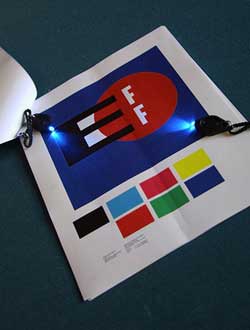
Close up of actual tracking dots, taken through a microscope

EFF has received many printer test sheets from around the world
Photo by Quinn Norton

One of the test sheets, shown with the blue LED lights we use to see the tracking dots
Photo by Quinn Norton
Is Your Printer Spying On You?
Imagine that every time you printed a document, it automatically
included a secret code that could be used to identify the printer - and potentially, the person who used it. Sounds like something from an episode of "Alias," right?
Unfortunately, the scenario isn't fictional. In a purported effort to identify counterfeiters, the US government has succeeded in persuading some color laser printer manufacturers to encode each page with identifying information. That means that without your knowledge or consent, an act you assume is private could become public. A communication tool you're using in everyday life could become a tool for government surveillance. And what's worse, there are no laws to prevent abuse.
The ACLU recently issued a report revealing that the FBI has amassed more than 1,100 pages of documents on the organization since 2001, as well as documents concerning other non-violent groups, including
Greenpeace and United for Peace and Justice. In the current political climate, it's not hard to imagine the government using the ability to determine who may have printed what document for purposes other than identifying counterfeiters.
Yet there are no laws to stop the Secret Service from using printer
codes to secretly trace the origin of non-currency documents; only
the privacy policy of your printer manufacturer currently protects you (if indeed such a policy exists). And no law regulates what sort of documents the Secret Service or any other domestic or foreign government agency is permitted to request for identification, not to mention how such a forensics tool could be developed and implemented in printers in the first place.
With no laws on the books, there's nothing to stop the privacy violations this technology enables. For this reason, EFF is gathering information about what printers are revealing and how - a necessary precursor to any legal challenge or new legislation to protect your privacy. And we could use your help.
In the preliminary research paper linked below, we explain what we've
observed so far, briefly explore the privacy implications, and ask you
to print and send us test sheets from your color laser printer and/or
a color laser printer at your local print shop. That way, we can watch
the watchers and ensure that your privacy isn't compromised in ways
that harm your fundamental consitutional rights.
In addition to documenting what printers are revealing, EFF has filed
a Freedom of Information Act (FOIA) request, and we will keep you updated
on what we discover. In the meantime, we urge you to participate and pass the word along about this research project. Thank you for your support!
More information
Articles
Government Uses Color Laser Printer Technology to Track Documents PCWorld, 2005
Dutch Track Counterfeits Via Printer Serial Numbers. PCWorld, 2004
FBI
Is Keeping Documents on ACLU and Other Peaceful Groups ACLU, 2005
Mailing list
People who are interested in participating in our research are
encouraged to join
the printers list to discuss our progress with other volunteers.


